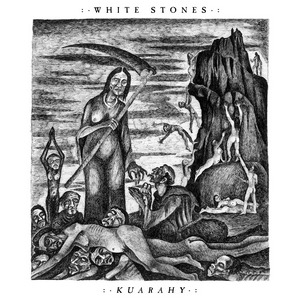The bassist for Opeth, Martin Mendez, comes front and center with White Stones. Given Opeth’s turn towards progressive rock over the years, White Stones allows Mendez (and company) to shift things back in a more death metal direction. That said, those expecting a Opeth-like return to death metal should consider this fair warning, though they will probably enjoy the experience that Kuarahy offers.
There are some elements of familiarity for Opeth fans, but thankfully it never overdoes it in that department. There’s an odd element of ‘chill’ to the death metal core that comes into play with the more laid-back moments (“Drowned in Time”), and the album’s greatest strengths are its sense of groove and progressive instrumentation. It eschews a more directly brutal assault for the most part due to these elements, but it helps the album to stand out on its own. The groove is what gives Kuarahy some bite to it, and “The One” and “Taste of Blood” are two fine examples of how the band can really go out and grab you with a solid hook. The progressive elements give the album a playful feel at times (“Worms”) and can occasionally give off an almost black metal-y twist (“Ashes”). Lastly, the sound is quite pristine, and as you can probably imagine, the bass is centered nicely in the mix and there’s a warm, lush feel that isn’t a common point for death metal of this sort.
Kuarahy has all the makings of setting up White Stones as a solid player within the scene. While rooted in death metal, the warmer tones have some potential to step things up further with the groovy and proggy elements to craft something rather interesting and more unique.


